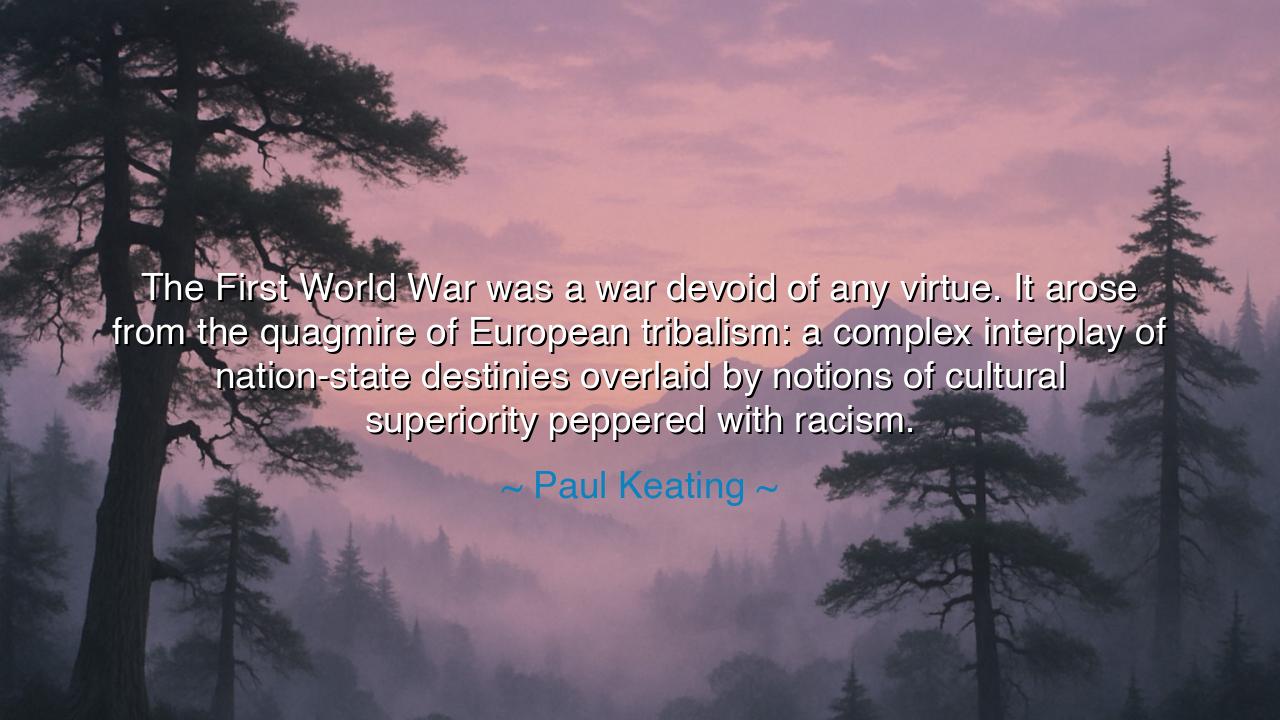
The First World War was a war devoid of any virtue. It arose
The First World War was a war devoid of any virtue. It arose from the quagmire of European tribalism: a complex interplay of nation-state destinies overlaid by notions of cultural superiority peppered with racism.






The Australian statesman Paul Keating once spoke with unflinching honesty when he declared: “The First World War was a war devoid of any virtue. It arose from the quagmire of European tribalism: a complex interplay of nation-state destinies overlaid by notions of cultural superiority peppered with racism.” In this searing judgment, Keating stripped away the veil of romance so often draped over that conflict and revealed it for what it was: not a noble crusade, but a catastrophe born of pride, fear, and folly.
The First World War began not with ideals of justice, but with alliances, rivalries, and arrogance. The assassination of a single archduke in Sarajevo ignited a conflagration because Europe was already a powder keg of tribalism—empires and nations jostling for supremacy, each convinced of its destiny, each mistrusting the other. Germany, Britain, France, Russia, and Austria-Hungary became locked in a death struggle not to defend truth or liberty, but to prove dominance, to settle grudges, and to maintain illusions of superiority. Thus, as Keating reminds us, the war was “devoid of virtue.”
Its racism and notions of cultural superiority added poison to the fire. Colonized peoples from Africa, Asia, and the Pacific were dragged into a European struggle that was never theirs, made to fight and die on foreign soil for masters who denied them equality. The Australians and New Zealanders at Gallipoli, the Indians in the trenches of Flanders, the Senegalese soldiers on the Western Front—all were swept into the bloodshed of imperial pride. Their sacrifices were real, their courage undeniable, but the cause they served was tainted with arrogance and prejudice.
One need only recall the horrors of the Somme in 1916, where in a single day nearly 60,000 British soldiers fell, most cut down by machine-gun fire in fields churned to mud. Did they die to defend the innocent? Did they fall to preserve justice? No—these were lives squandered in a futile push, commanded by generals clinging to outdated tactics, in service of a war that had lost all meaning but the survival of national pride. Here, Keating’s words echo with force: this was a war without virtue, a sacrifice without noble cause.
The lesson of Keating’s words is not to dishonor the soldiers, but to expose the emptiness of the conflict itself. The men who fought were brave, but bravery cannot sanctify folly. To honor them truly is to speak the truth: they were sacrificed by leaders who failed them, by nations ensnared in tribalism and blinded by pride. In naming the war as devoid of virtue, Keating calls us to remember not the romance of sacrifice, but the tragedy of waste.
For us who live today, his warning is timeless. Whenever nations begin to speak of destiny, superiority, or tribal pride, whenever leaders cloak their ambitions in the language of culture or race, we must beware. These are the seeds from which senseless wars grow. Just as the First World War was born from arrogance and rivalry, so too can new wars emerge when pride is left unchecked. The true patriot is not the one who glorifies war, but the one who works tirelessly to prevent its return.
Therefore, let this wisdom endure: never again must we cloak destruction in the garments of nobility. Let us honor courage, but never sanctify folly. Let us remember the millions who perished in a war “devoid of virtue,” and let their memory stand as a wall against the return of such madness. For the path of pride leads always to desolation, but the path of humility, justice, and truth leads to peace.






HD11_1-Nguyen Hai Duong
Keating’s statement highlights how intertwined nationalism, racism, and war can be. It makes me wonder: were the seeds of the Second World War already planted in that toxic mix? When nations believe in their superiority, conflict becomes inevitable. Is this simply human nature, or can education and global cooperation truly overcome such deep-seated divisions? The question remains painfully relevant today.
PNPhu Nguyen
I find this quote deeply sobering because it strips away the illusion of noble intent in war. If the First World War was the result of arrogance, competition, and racism, then it wasn’t just a failure of politics — it was a failure of civilization. Have we really learned from that? Looking at today’s tensions, it feels like the same forces are still shaping international relations in new disguises.
TNthuy nguyen
This reflection forces me to question how history has been written. We often hear about the bravery and patriotism of soldiers, but rarely about the senselessness of the causes that sent them to die. Can we truly honor the fallen while also condemning the war itself? It’s a moral paradox — to remember with pride something that was, at its core, an outcome of human failure.
TNThao Nguyen
The way Paul Keating describes the First World War feels brutally honest. It wasn’t about freedom or justice, but about pride and racial superiority. That raises an uncomfortable question — are most wars just dressed-up versions of the same tribal conflicts? If nations still define themselves by competition and dominance, how can global peace ever be achieved? Maybe the root problem is not politics, but human ego.
NNhien
What stands out to me is the phrase ‘European tribalism.’ It’s a striking way to describe the nationalism that consumed Europe in the early 20th century. I can’t help but think about how similar patterns of tribal thinking still exist today — only now they’re masked as patriotism or cultural pride. Are we doomed to repeat such cycles, or can humanity evolve beyond these destructive rivalries?